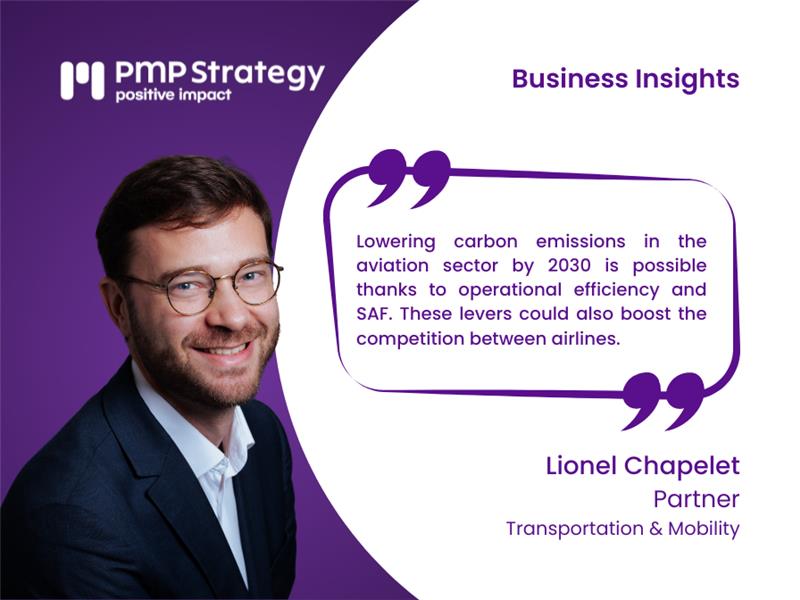The decarbonization of aviation is a complex challenge that requires a long-term global approach. However, the industry is already activating several short-term levers to reduce its carbon footprint which will directly impact the competition between airlines.
Operational efficiency can reduce aviation energy demand by 40%
A first lever to reduce the carbon footprint of aviation is actionable right now; it consists of improving operational efficiency: optimization of routes, consumption and maintenance of aircrafts, or improvement of air traffic management. Manufacturers are constantly working on the design of more fuel-efficient aircrafts, which helps to reduce greenhouse gas emissions. New generations of aircraft allow for a reduction in emissions of about 20% to 25%, they also contribute to reduce the noise footprint by one-third. According to the MPP (Mission “Project Possible”), an alliance under the auspices of several international organizations including the World Economic Forum, energy efficiency gains related to operational efficiency could reach up to 2% per year. These benefits are likely to reduce global aviation energy demand by 40% by 2050.
Sustainable aviation fuels are expected to contribute to more than half of the decarbonization goals
The reduction of aviation’s carbon footprint should also rely on the use of Sustainable Aviation Fuel (SAF), which can reduce CO2 emissions by 80% depending on the different technologies. Aircrafts are already compatible with SAF, with incorporation rates of up to 50%.
Many airlines have been experimenting with the use of SAF for several years. In 2023, Air France-KLM announced it had incorporated 80,000 metric tons of SAF, which represented 16% of global production.
In Europe, several companies are preparing to increase the share of SAF in their consumption, under the impetus of the new European regulation ReFuelEU Aviation, which requires fuel suppliers to supply European airports with a minimum quota of sustainable fuels of 2% from 2025. This share will increase every 5 years to reach 70% by 2050. The EU’s goals surpass those adopted at the national level. In France, the roadmap defined in 2020 previously envisaged a rate of 50% by 2050.
At a global level, SAF production is expected to triple in 2024 to reach 1.875 billion liters (1.5Mt), accounting for 0.53% of aviation’s fuel need and representing 6% of all renewable fuel production. SAF production will need to reach 30 billion liters (24 million tonnes) by 2030, thus be multiplied by 16.
Decarbonization of the aviation sector relaunches competition
The use of SAF requires massive investments to support the increase in their production, which should also result in a reduction of their price. Indeed, SAF would cost 4 to 10 times more than kerosene, depending on the different technologies and geographies. The United States supports its SAF industry with strong aid and subsidies. In France, SAF was around €5,000 per ton in 2023, compared to €3,000 globally and between €2,000 and €2,500 in the United States. Buying expensive fuel will have a direct impact on the margins of airlines tomorrow, as fuel accounts for 30 to 35% of an airline’s costs. As a result, SAF sourcing strategy will increasingly become a differentiating factor for airlines. Airlines capable of buying and negotiating large multi-annual volumes of SAF at competitive costs, as well as those able to pass through the fuel costs increase in the ticket prices will have a competitive edge.
In conclusion, lowering carbon emissions in the aviation sector by 2030 is possible thanks to gains in operational efficiency and the development of SAF. However, these levers represent new areas for improving performance and differentiation, which could boost the competition between airlines.
Lionel Chapelet
Partner
PMP Strategy
About PMP Strategy
PMP Strategy’s sectorial expertise extends to four focus areas: Telecoms, Media & Technology, Transportation & Mobility, Energy & Industry Decarbonization (with a focus on new energies, hydrogen, and decarbonization), and Financial Services & Institutions. In addition to these sectors, we offer three transversal cross-border services: CFO advisory (including ESG management), Digital/E-commerce/Customer Experience consulting and Private Equity.
PMP Strategy is managed by 21 partners, which include 5 of the Founders. Over the past twenty years, we have established ourselves as trusted premium partners to CEOs and CFOs with over 4,000 successful projects driven by our international team of 150 specialized consultants and a wide network of expert advisors. PMP Strategy operates from three key hubs: Europe, North America, and the Middle East.
We build enduring relationships with our clients by working collaboratively to find tailor-made and innovative solutions to the challenges they face. In addition to our sectorial expertise, our commitment to diversity, people-centricity, and openness are the foundations of our success and remain integral to our entrepreneurial practice. It’s a winning combination that drives consistent growth each year.
Press contact:
Jennifer Campbell
+33 6 32 05 14 27
jcampbell@pmpstrategy.com






